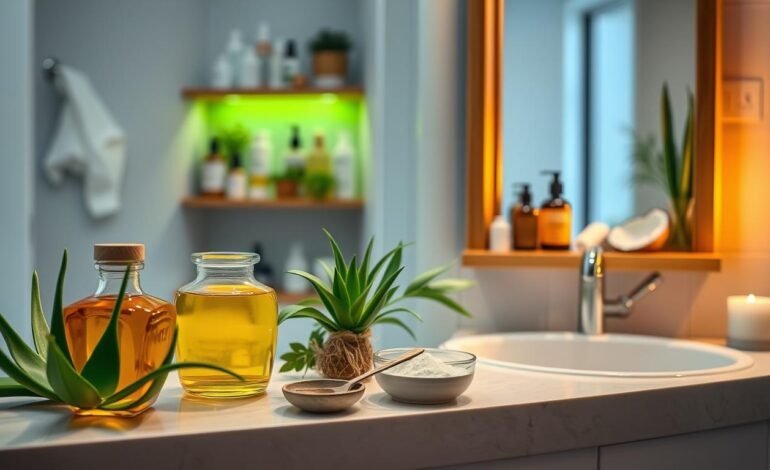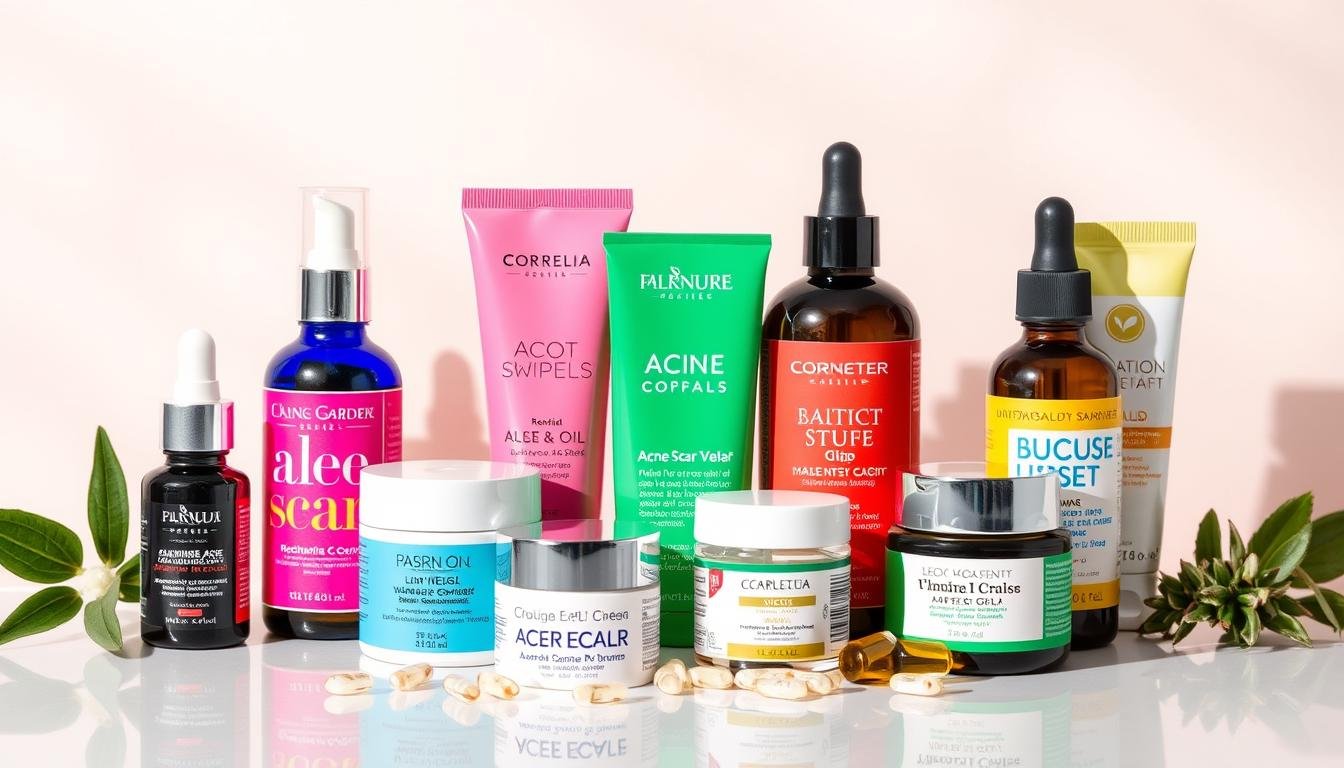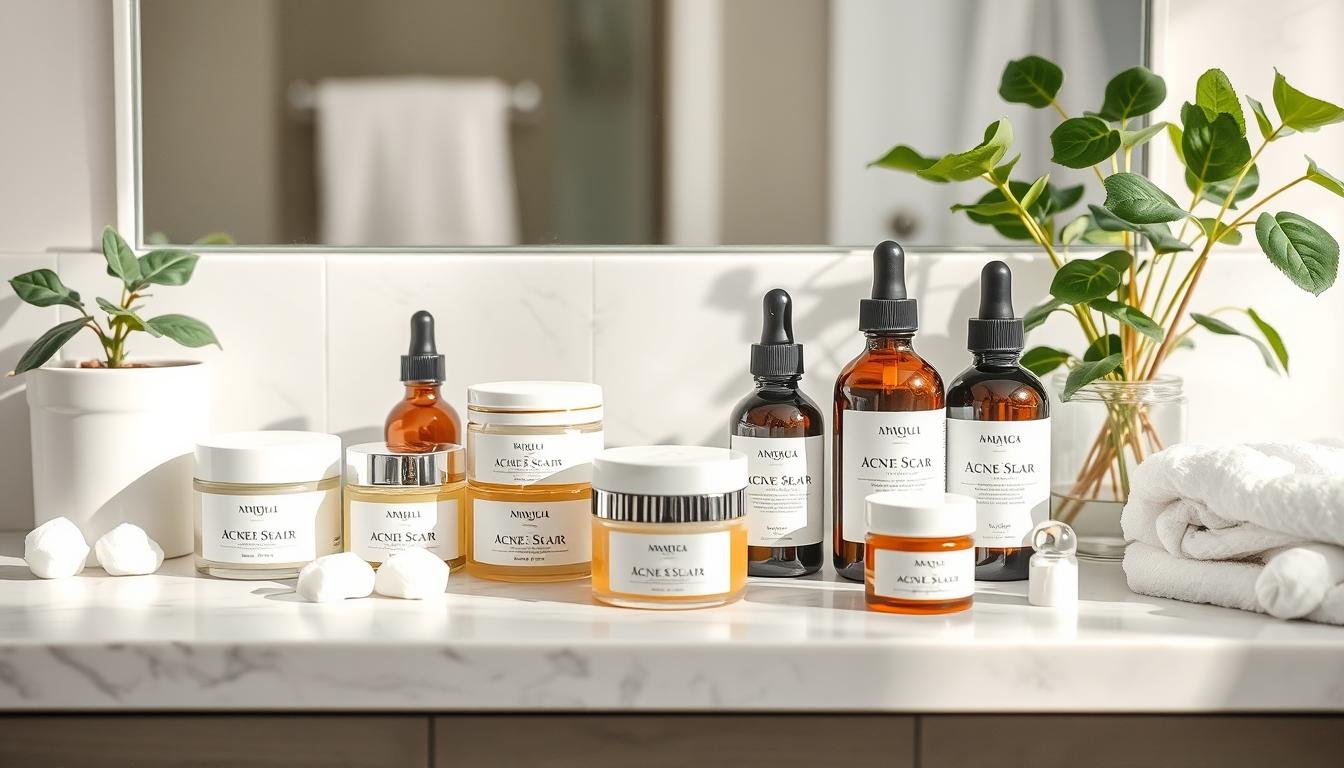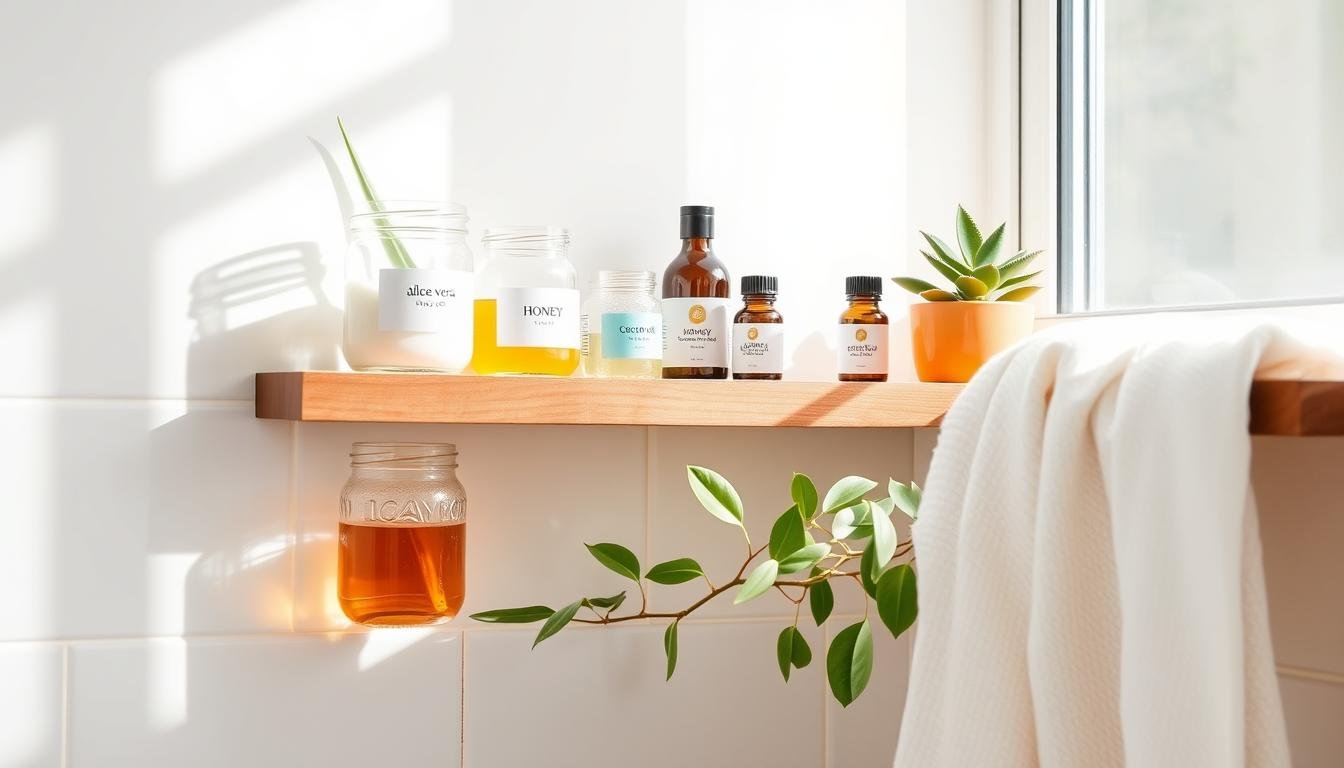Effective Acne Scar Treatment At Home Methods

Acne Scar Treatment At Home is a common skin issue that can lead to scarring. These scars happen when the skin tries to fix itself after blemishes. They can be as upsetting as the acne itself.
This article will look at ways to treat acne scars at home. We’ll cover over-the-counter remedies, medical treatments, and natural options. Knowing about different types of scars and why they happen can help you improve your skin. It can also boost your confidence.
Key Takeaways
- Acne scars are a common consequence of the skin’s natural healing process.
- Understanding the different types of acne scars and their causes is crucial for effective treatment.
- A variety of at-home methods, including over-the-counter remedies, medical treatments, and natural solutions, can be effective in treating acne scars.
- Adopting a comprehensive skincare routine and addressing the underlying causes of acne can help prevent and treat acne scars.
- Seeking professional advice from a dermatologist can ensure the most effective and tailored treatment for individual skin concerns.
Types of Acne Scars and Their Causes
Many people worry about acne scars. Knowing the different types and why they happen is key to treating them. There are three main types: atrophic, hypertrophic, and keloid.
Also Read : Best Skincare Cleansers For Glowing Skin
Atrophic Acne Scars
Atrophic scars are small dents in the skin. They include icepick, boxcar, and rolling scars. These types of acne scars happen when the skin doesn’t make enough fibroblasts. This leads to less collagen and a sunken look.
Also Read : Effective Skin Care Routine With Tretinoin
Hypertrophic Acne Scars
Hypertrophic scars are raised. They happen when the skin makes too many fibroblasts. These hypertrophic acne scars can look bad and may itch or hurt.
Also Read : How Can You Treat Dry Skin?
Keloid Acne Scars
Keloid scars are like hypertrophic scars but thicker and darker. They can itch or hurt too. Keloid acne scar causes often come from too much collagen during healing.
Also Read : Natural DIY Skin Care Tips For Radiant Skin
Knowing the types of acne scars and their acne scar causes helps find the best treatment. By tackling the root problems, people can make their skin look better and feel more confident.
Also Read : How To Create Nourishing DIY Masks Using Natural Ingredients?
Over-the-Counter Remedies for Acne Scar Treatment At Home

Dealing with acne scars can be tough. But, there are many over-the-counter (OTC) options that can help. These treatments aim to reduce the look of scars and are a good first step to clearer skin.
Over-the-counter acne scar treatments, like acne scar creams and acne scar serums, have ingredients like salicylic acid and retinoids. Salicylic acid helps unclog pores and reduce inflammation. It also promotes cell turnover, making scars look better. Retinoids, on the other hand, block inflammation and help skin cells regenerate. This can fade discoloration and smooth out indented scars.
Another option is alpha hydroxy acids (AHAs), such as lactic acid. These gentle exfoliants reveal new skin and reduce acne scars by removing damaged cells.
While these over-the-counter acne scar treatments can be helpful, they might not get rid of all scars. It’s best to use them as directed and talk to a dermatologist. Some ingredients can irritate sensitive skin.
OTC acne scar creams and acne scar serums with salicylic acid, retinoids, and alpha hydroxy acids are a good start for treating scars at home. But, for serious scarring, you might need more medical treatments for the best results.
Medical Treatments for Acne Scars

For tough or deep acne scarring, a dermatologist can help. They use advanced methods to make acne scars less noticeable. These treatments can last a long time.
Chemical peels with trichloroacetic acid (TCA) can improve acne scarring by up to 70%. Steroid injections soften and flatten raised hypertrophic or keloid scars.
Dermal fillers like collagen and hyaluronic acid fill in indented atrophic scars. Microneedling boosts collagen to smooth the skin. Laser treatments also resurface the skin, reducing acne scarring.
Finding the right acne scar treatment depends on your skin and scars. A dermatologist can suggest the best medical acne scar treatments for you.
| Treatment | Description | Effectiveness |
|---|---|---|
| Chemical Peels | TCA peels that remove the outer layers of the skin | Up to 70% improvement in acne scarring |
| Steroid Injections | Injections that help soften and flatten raised scars | Effective for hypertrophic and keloid scars |
| Dermal Fillers | Collagen, hyaluronic acid, and poly-L-lactic acid injections to fill in indented scars | Improved appearance of atrophic scars |
| Microneedling | Procedure that stimulates collagen production to smooth skin texture | Helps reduce the appearance of acne scarring |
| Laser Treatments | Resurfacing the skin to reduce the visibility of acne scars | Effective for improving the overall appearance of acne scarring |
Getting help from a dermatologist is key for acne scar treatments. They can find the right medical acne scar treatments for you. This way, you can get smoother, more confident-looking skin.
Natural Remedies for Acne Scar Treatment At Home

Some people choose natural remedies over medical treatments for acne scars. These home solutions are often gentler and cheaper. They can help with minor scarring.
Black seed oil and rosehip seed oil are known to help wounds heal and even out skin color. This can make acne scars less noticeable. Honey has antibacterial and anti-inflammatory properties that may reduce scars. Aloe vera can also lessen inflammation and scar size.
- Black seed oil for acne scars
- Rosehip oil for acne scars
- Honey for acne scars
- Aloe vera for acne scars
While natural remedies can help with minor scars, they might not work as well for deeper scars. Always talk to a dermatologist before trying new remedies. They can cause irritation or have unknown side effects.
“Natural solutions may be a gentler alternative, but they won’t be as powerful as professional treatments for stubborn acne scars.”
Choosing between natural treatments and medical options depends on your skin and scars. By trying both, you can find the best way to improve your skin.
Conclusion
Acne scars can be really tough to deal with. But, there are many ways to treat them, from home remedies to professional treatments. Knowing what kind of scars you have is the first step to finding the right treatment.
For mild to moderate scars, over-the-counter products like salicylic acid and retinoids can help. These ingredients can improve your skin’s look. But, if your scars are more serious, you might need to see a dermatologist.
They can suggest treatments like chemical peels or laser resurfacing. Some people also try natural remedies, but be careful with these. Remember, treating acne scars takes time and effort.
Learning about the best treatments for acne scars can help you choose the right one. With the right plan and consistent care, you can make your skin look better. This way, you can feel more confident about your skin again.
FAQs
Q: What are some effective home remedies for acne scar treatment?
A: Effective home remedies for acne scar treatment include using natural ingredients like aloe vera, honey, and lemon juice. These natural remedies can help reduce the appearance of scars and promote skin healing.
Q: How can I get rid of acne scars using natural remedies?
A: You can get rid of acne scars by applying natural remedies such as tea tree oil, coconut oil, and vitamin E oil. These remedies help in reducing the appearance of scars and improving skin health.
Q: What type of acne leads to scarring?
A: Severe acne, such as cystic acne and nodular acne, is more likely to lead to scarring. The type of acne that causes scars often includes deep lesions that damage the skin, resulting in different types of acne scarring.
Q: Should I consult a dermatologist for acne scar removal?
A: Yes, consulting a dermatologist is advisable for acne scar removal. They can recommend effective treatments for acne scars, including laser treatment and chemical peels, tailored to your skin type and scar types.
Q: What treatments work best for reducing the appearance of acne scars?
A: Treatments that work best for reducing the appearance of acne scars include laser treatment, chemical peels, and microneedling. These treatments help to promote collagen production and improve skin texture.
Q: What is the treatment of atrophic acne scars?
A: The treatment of atrophic acne scars often involves procedures like dermal fillers, laser resurfacing, or chemical peels. These methods aim to fill in depressed scars and enhance the overall skin appearance.
Q: Can I treat acne and acne scars at the same time?
A: Yes, you can treat acne and acne scars simultaneously. Using treatments that target active acne, such as topical retinoids, can help prevent further scarring while also addressing existing scars.
Q: How do raised scars differ from other acne scars?
A: Raised scars, such as hypertrophic and keloid scars, occur when the body produces excess collagen during the wound healing process. These scars differ from atrophic scars, which are sunken and result from the loss of tissue.
Q: Are there any effective treatments for severe acne scars?
A: Yes, effective treatments for severe acne scars include advanced options like subcision, laser therapy, and deep chemical peels. These treatments can significantly improve the appearance of severe acne scarring.
Q: What role does collagen play in acne scar treatment?
A: Collagen plays a crucial role in acne scar treatment as it helps to rebuild skin structure and elasticity. Treatments that stimulate collagen production can effectively reduce the appearance of acne scars.





